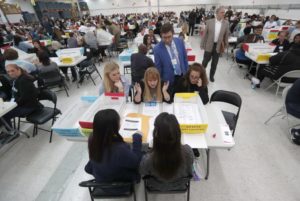
SARASOTA, Fla. (AP) — As Florida’s elections supervisors meet for the first time since the Nov. 6 election, they say that despite some recent problems, the majority of the counties handled things smoothly.
The Florida State Association of Supervisors of Elections is meeting in Sarasota this week.
In their estimation, the November election went as it should have.
“The system worked very, very well,” said Alan Hayes, supervisor of elections in Lake County, adding that 66 of 67 counties met the recount deadline. “There are changes that need to be made, but not a drastic overhaul.”
The supervisors were quick to acknowledge problems. Palm Beach County, for instance, missed the recount deadline because of outdated equipment. Supervisor of Elections Susan Bucher wasn’t at the Sarasota gathering.
“She’s counting ballots as we speak,” said Hays, who added that Bucher plans to buy new equipment.
This year’s recounts made some recall the 2000 presidential election, when it took Florida more than five weeks to certify George W. Bush the winner. This year it took two weeks certify Nov. 6 election results due to close races, recounts and controversies. Florida was roasted on late night TV shows and was again the butt of jokes.
Yet even amid the criticism, some officials observed a spirit of civility.
During the throes of the recount, Volusia County Supervisor of Elections Lisa Lewis noticed that lawyers for candidates from both parties, along with observers, bought each other snacks as both the machine and hand recounts dragged on. They brought in coffee for everyone in the mornings. They laughed together.
“I thought, this is how elections should be,” said Lewis.
Broward County was at the center of complaints this year. Governor Rick Scott suspended Broward Supervisor of Elections Brenda Snipes for misfeasance, incompetence and neglect of duty. Scott cited problems during the recount, including reports of more than 2,000 ballots being misplaced. Snipes, who was appointed by then-Gov. Jeb Bush in 2003, has been elected three times. She had announced her resignation before Scott suspended her, and over the weekend, she rescinded her resignation.
She wasn’t at the Sarasota meeting.
Legislators have said they will scrutinize elections laws during next year’s session to avoid problems in 2020, the next major election. Among the possibilities: changing the timelines and deadlines for recounting ballots, and extending the absentee ballot timeline.
“No matter how well it works, there’s always ways to look for it to be better,” said Lori Scott, Brevard County’s supervisor of elections. Expanding the days to count the mail-in ballots might be a good idea, she said, because so many people vote by mail now and it is a crush of work for larger counties. Currently, counties can open mail ballots and begin counting them 15 days before the election.
All supervisors agreed that voter outreach and education are key, especially in the era of social media.
Hays said voters “should also accept responsibility” and make sure their ballots are marked correctly, with proper signatures, so they’re easily processed when the time comes to count.
Scott said she’s had to battle rumor and outright lies because people spread misinformation on Twitter and Facebook. She recently went on a radio program and a caller asked why mail ballots are only counted close races, and why ballots with under votes aren’t counted.
Neither of those things are true, Scott said. All mail ballots are counted, and ballots where a voter didn’t fill in a race or question aren’t thrown out. Some people just don’t have enough information to vote in a race or an amendment and often leave those blank — but the other, completed portions of the ballot are counted.
“It’s really important that collectively, we as citizens and voters not pass on disinformation that undermines the confidence of the electoral process,” she said.














